Is your hot water system showing its age or running inefficiently? It’s probably time for a replacement. In this article, we’ll show you how to spot the need for hot water system replacements, pick the best new system for your home, and understand installation costs—plus tips to ensure you make a smart, eco-conscious choice.
Key Takeaways
- Hot water systems should be replaced based on age, efficiency, and functionality, with signs like rust, leaks, and inconsistent temperatures indicating a need for replacement.
- Choosing a new hot water system involves considering energy sources (electric, gas, solar, heat pump), system size, and installation costs, balancing between efficiency, cost, and environmental impact.
- Maintenance is crucial for the longevity and efficiency of hot water systems, with recommendations for professional installation, regular check-ups, and energy-saving measures such as insulation and using off-peak tariffs.
When Is It Time to Replace Your Hot Water System?
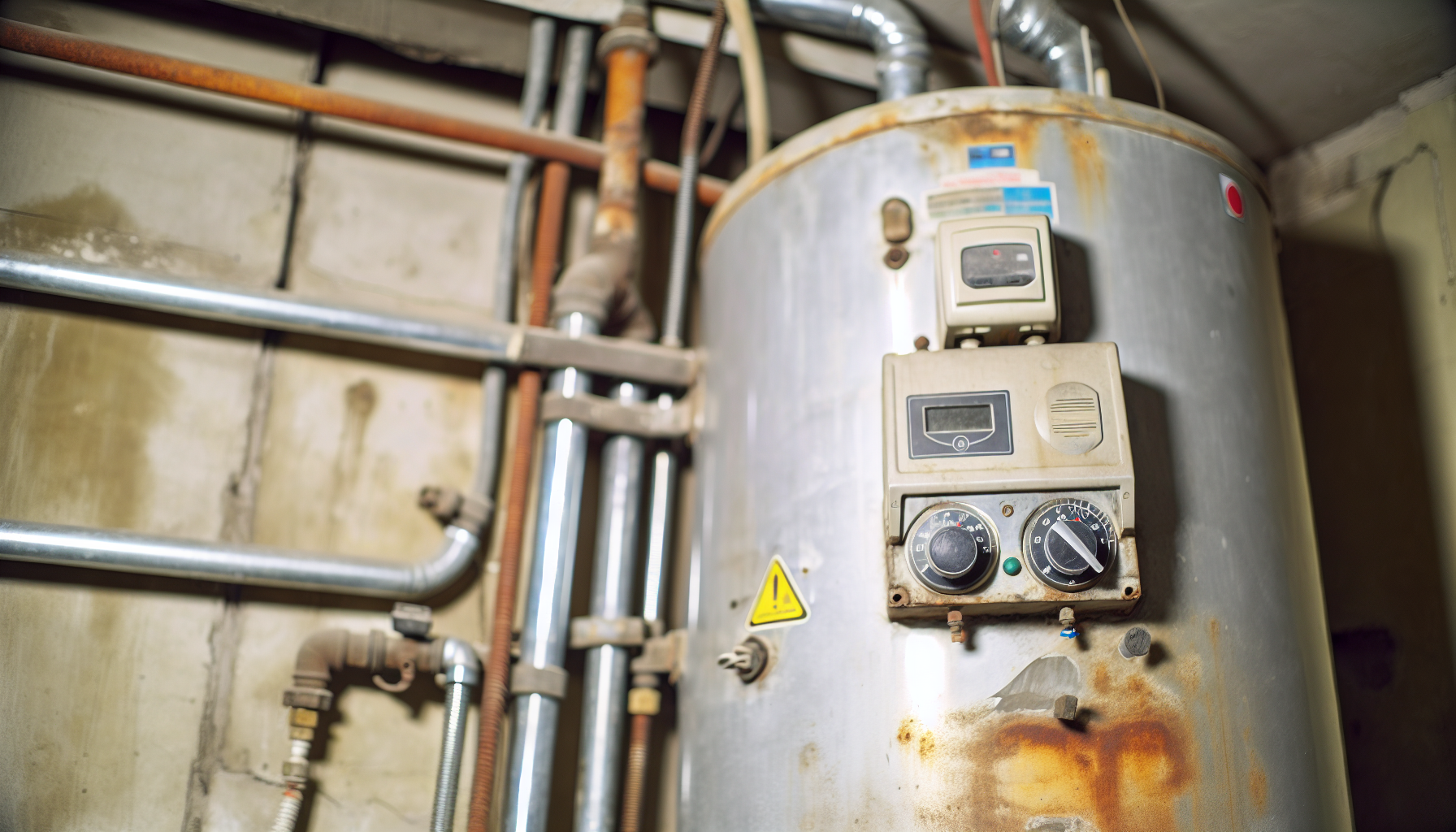
Just like any other appliance in your home, your hot water system has a lifespan. It doesn’t matter if it’s a gas, electric, or solar hot water system, they all age and eventually need to be replaced. So, how do you determine the right moment for replacement? Begin by evaluating the age of your system. The typical lifespan of water heaters ranges between 10 and 15 years for electric systems and 15 to 20 years for gas systems. If your system is within this age range, it would be wise to start considering a replacement.
Efficiency is another significant element to examine. As a hot water system gets older, its efficiency gradually decreases, leading to higher energy bills. However, how can you accurately determine your system’s age? Simple. Look for an identifying sticker or label on the system. This will contain details such as:
- Capacity
- Model
- Serial numbers
- Other specifics that can aid in determining its age.
Identifying Age and Efficiency
Determining your hot water system’s age is a crucial first step towards recognizing the need for replacement. This information can typically be found by examining the identifying sticker or label on the system, which contains details such as the capacity, model, and serial numbers. Once you know the age, the next step is to assess its efficiency. Look out for indicators such as:
- visible rust and corrosion
- leaks around the hot water tank
- lukewarm or cold water when it should be hot
- unusual rumbling or banging noises
If any of these indicators are present, it’s a clear sign that the system’s efficiency is compromised.
Regular servicing every 1-2 years is recommended to maintain efficiency and extend the system’s life.
Recognising Functional Issues
Aside from age and efficiency, functional issues are also a significant indicator that it might be time to replace your hot water system. Some common functional issues in hot water systems include:
- Variability in water temperature
- Water leakage
- Malfunctioning pressure and temperature relief valve (PTRV)
- Unpleasant odor in the water
- Noisy system operation
- Tank leaks
- Low water pressure
- Slow heating
- Cold final shower
If you notice any of these issues, it could be an indication that your hot water system needs to be replaced.
Continuous flow systems, such as a continuous flow system, can help address some of these issues by providing hot water on demand.
Choosing the Right Hot Water System Replacement
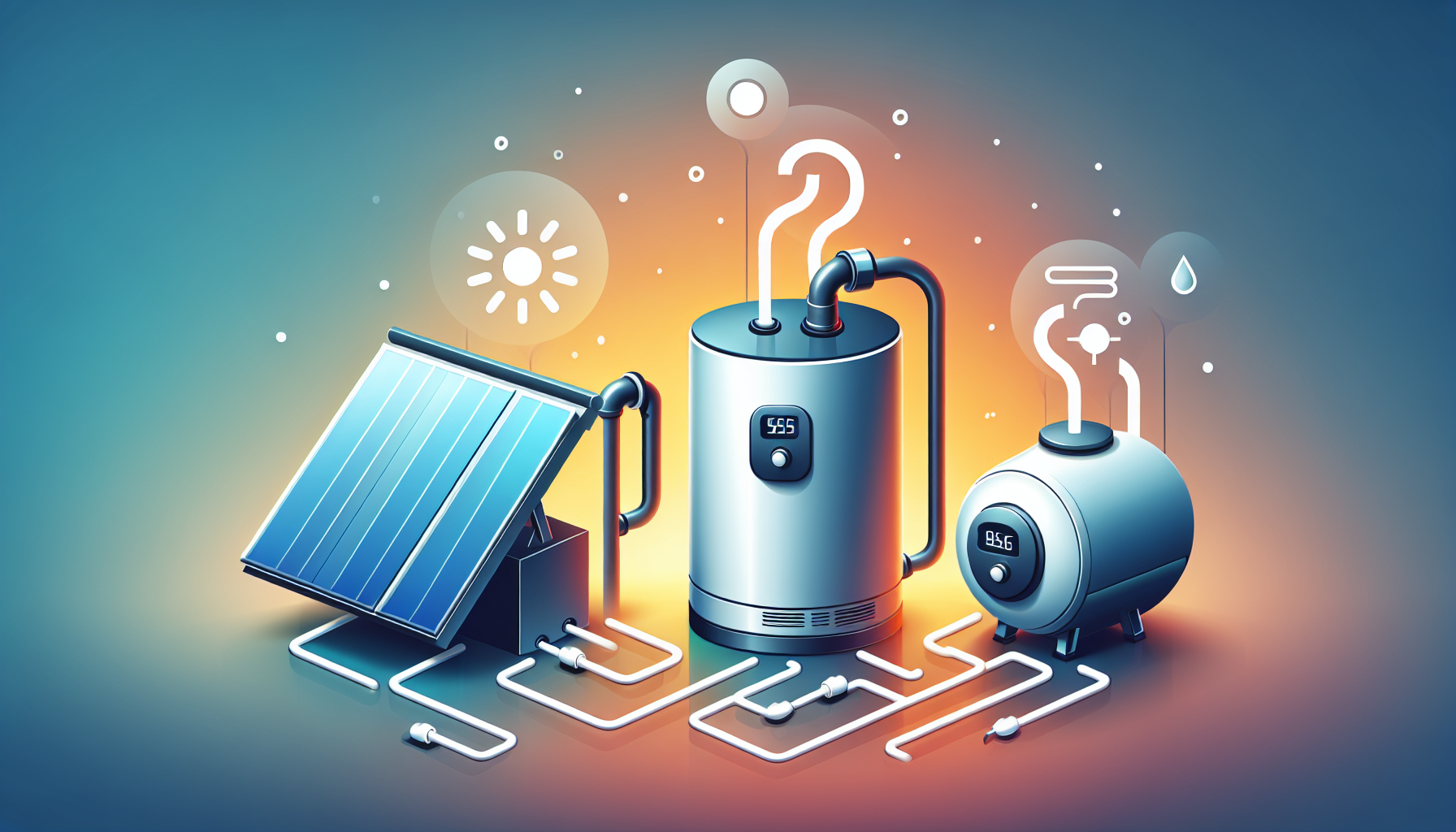
Having established the need for a new hot water system, your subsequent task is to select an appropriate replacement. But with so many options available in the market, this can seem like a daunting task. Fear not, we’re here to help!
The energy source and size of the system are critical considerations when selecting a replacement. The main energy sources used in hot water systems are:
- Electric
- Solar
- Heat pump
- Gas
The selection of the energy source depends on factors such as local availability, cost, and environmental impact.
When it comes to sizing, it’s important to balance the household’s daily hot water demands without incurring unnecessary costs with a system that’s too large, or facing shortages with one that’s too small.
Evaluating Energy Sources
The choice of energy source is instrumental in deciding on a hot water system replacement. There are several options to consider:
- Gas systems use a gas burner to heat water.
- Electric systems use electric elements to heat water.
- Solar hot water systems harness the sun’s energy to heat water.
- Heat pump water heaters are also considered energy-efficient options.
Consider these options when choosing a hot water system replacement.
Furthermore, electric hot water systems are considered to have a lower environmental impact due to their reduced greenhouse gas emissions in comparison to gas-powered alternatives. Hence, it’s vital to compare different energy sources based on efficiency, environmental impact, and cost before making a final decision.
Sizing Your System
Sizing also plays a key role when selecting a hot water system replacement. The size of the hot water system needed can be influenced by various factors, such as:
- Household size
- Specific household circumstances
- Energy source and system type
- Local climate
- Insulation and tank quality
- Energy efficiency and capacity needed
A larger family or a house with more hot water outlets will generally require a hot water system with greater capacity to ensure a consistent supply of hot water to all points of use. Incorrect sizing can lead to increased costs over time.
An oversized system can lead to energy wastage, while an undersized system may struggle to meet growing or changing demand.
Installation Costs and Considerations
After choosing the suitable hot water system, the subsequent phase is the installation. The cost of hot water system installation can vary significantly, depending on several factors such as:
- The size and design of the water heater
- The brand of the hot water system
- The complexity of the installation task
- Any supplementary features or enhancements selected
When planning for a replacement, these costs should be incorporated into your budget.
Understanding Installation Expenses
A clear understanding of the breakdown of installation costs aids in making an informed decision about your hot water system replacement. The typical expense associated with the installation of a new hot water system can range from $1,000 to over $7,000, depending on a variety of factors. The labour cost for installation typically ranges from $1,150 to $3,200.
Necessary materials for a hot water system installation typically include Teflon tape, screwdriver, wrenches, wood saw, pliers, and copper pipes, with their costs varying.
The Role of Professional Installers
While a DIY approach may be tempting, recognizing the contribution of professional installers in the installation process of your hot water system is crucial. Professional installers offer the following benefits:
- Ensure precise installation of each component, leading to enhanced durability and reliability of the system
- Adhere to safety regulations to ensure the safety of your home and family
- Provide effective repairs and maintenance services to keep your hot water system running smoothly
By hiring professional installers, you can ensure that your hot water system is installed and maintained properly, giving you peace of mind and saving you time and effort.
Moreover, warranties for hot water systems often require professional installation to remain valid, so you could risk voiding your warranty if you choose to DIY.
Heat Pump Water Heaters: A Sustainable Choice
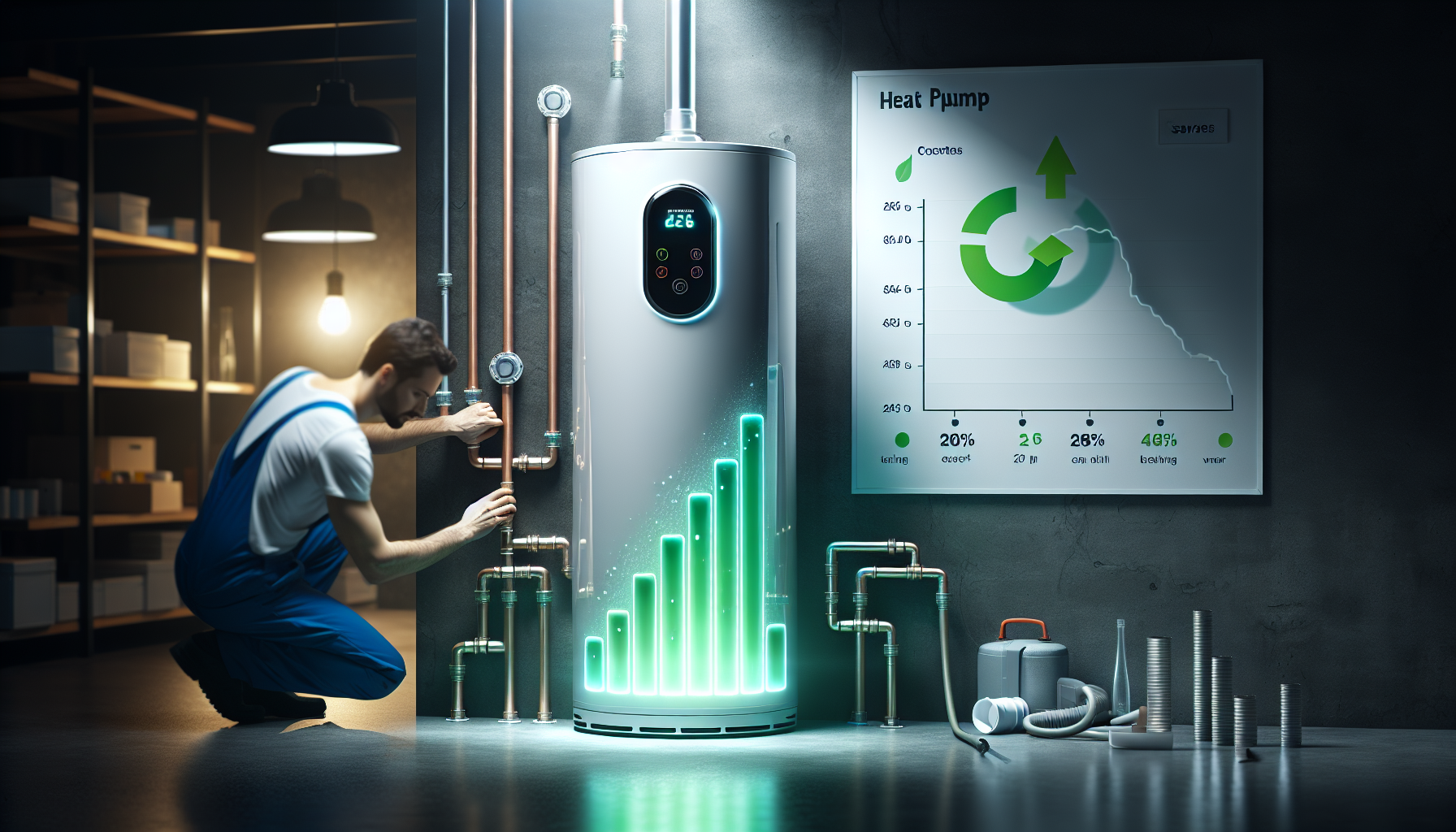
Heat pump water heaters are worth considering if you’re in the market for an eco-friendly and cost-effective hot water system. These systems utilise a refrigeration cycle and a heat exchanger to transfer heat from the surrounding air to the water in the tank. They’re considered a sustainable choice due to their:
- Efficient use of renewable heat sources
- Lower energy usage and operating costs
- Fewer greenhouse gas emissions compared to traditional gas water heaters.
Cost-Efficiency and Environmental Benefits
Heat pump water heaters offer not only environmental benefits but also cost efficiency. They consume significantly less electricity than traditional electric water heaters, making them a prudent choice for homeowners from both financial and environmental perspectives. They can result in annual savings of approximately $330 on electric bills for a household of four individuals, and even greater savings when compared to traditional gas or electric water heaters.
Government Incentives for Heat Pumps
Several government incentives encourage homeowners to adopt energy-efficient appliances, such as heat pump hot water systems. These incentives are typically integrated into energy savings schemes or programs and serve to mitigate the expense of transitioning to a more energy-efficient hot water system.
For instance, the Solar Homes Program rebates in Victoria, offer households up to $1000 to support the purchase of an eligible heat pump or solar hot water system.
Solar Hot Water Systems: Harnessing Renewable Energy
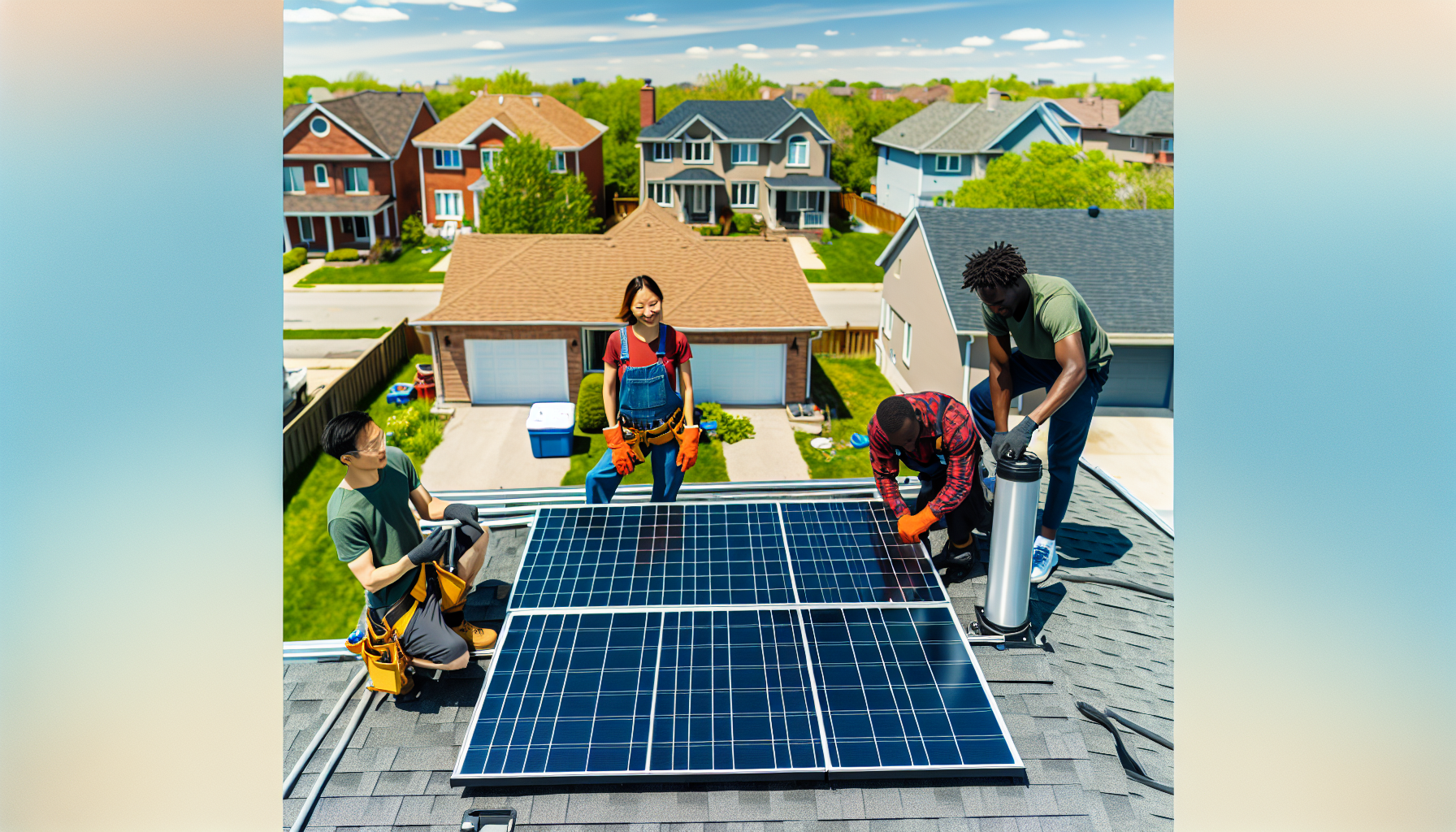
Solar hot water systems make an excellent choice for those seeking to utilise renewable energy for their hot water needs. These systems capture energy from the sun’s rays through roof-mounted solar collectors and then utilize this energy to heat the water.
Transitioning to a solar hot water system can result in decreasing hot water expenses by a minimum of 50%, and often even more, thereby establishing it as a financially viable solution in the long term.
Types of Solar Systems
Your specific needs and circumstances will guide your choice of solar hot water system. There are several types of solar hot water systems available, flat plate collectors, evacuated tube collectors, and heat pump systems.
On the other hand, passive solar hot water systems circulate a non-freezing, heat-transfer fluid through the collectors and a heat exchanger, which heats the water that then flows into the home.
Financial Incentives for Solar Upgrades
Similar to heat pump systems, solar hot water systems also offer numerous financial advantages. For systems placed in service after December 31, 2016, and before January 1, 2020, the federal tax credit is 30% of the total cost. After that period, the tax credit is 26% of the total cost. However, solar water heaters can only be eligible for this tax credit if a minimum of 50% of the energy produced by the system is utilized for water heating purposes.
Gas Hot Water System Replacements
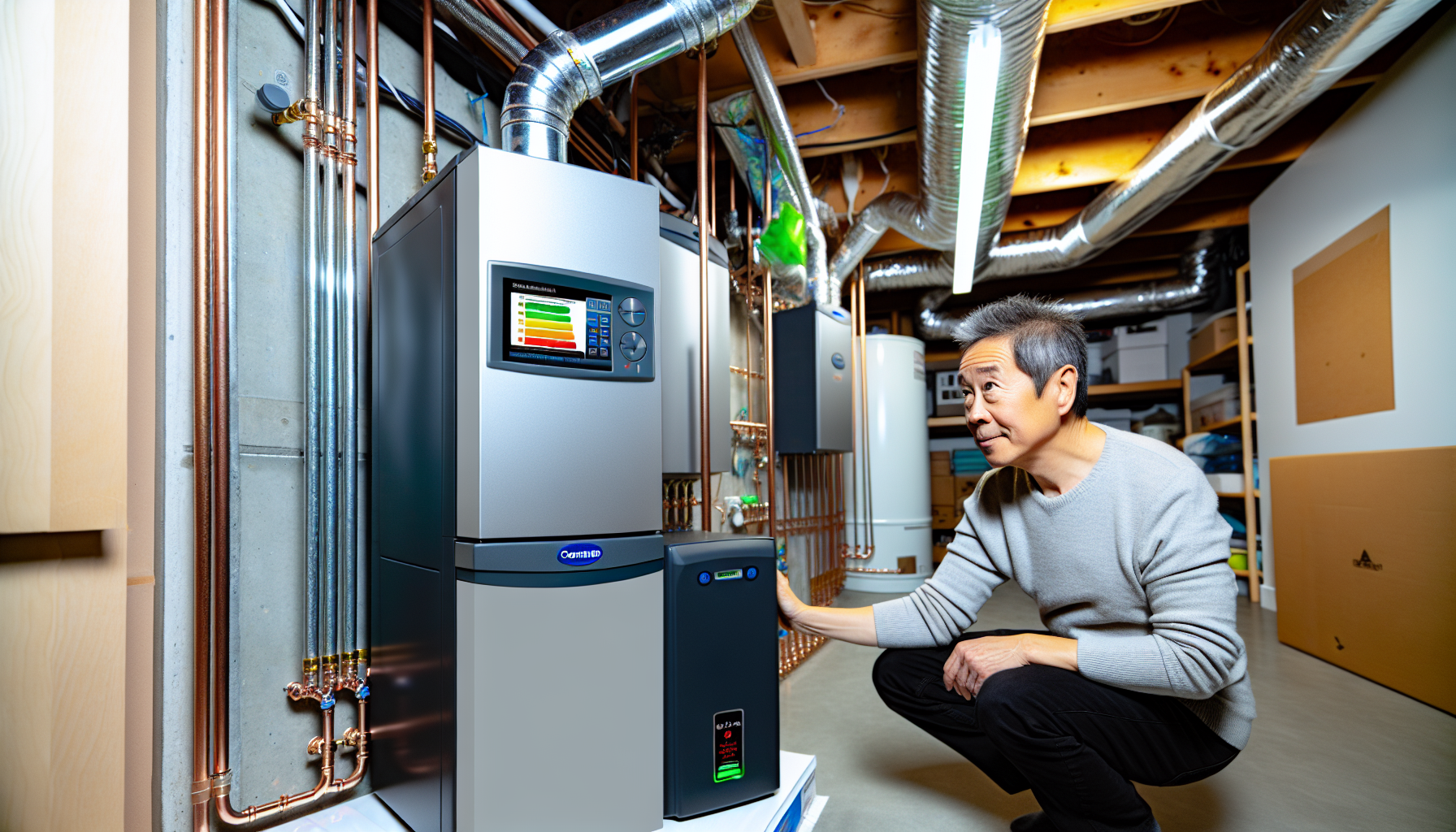
Gas hot water systems remain a viable option for those favouring a more traditional approach. In a gas hot water system, the opening of a hot water tap triggers the flow of cold water into the unit, where a sensor detects the flow and ignites a burner. The heat produced is then transferred to the water in the heat exchanger, delivering hot water to the tap.
Gas hot water systems, especially efficient hot water systems, exhibit higher efficiency than electric ones as they heat water more rapidly and require less frequent operation, thereby reducing energy consumption. One of the key components in these systems is the water heater, which plays a crucial role in providing hot water to your home.
Transitioning to Gas
Transitioning to a gas hot water system carries multiple benefits. Reduced operating costs attributed to the generally lower cost of gas compared to electricity, enhanced energy efficiency, and quicker heating times are just a few of the benefits.
While the upfront investment for a gas hot water system exceeds that of an electric hot water system, the operational expenses for gas systems can be lower due to their higher efficiency.
Natural Gas vs. LPG
For gas hot water systems, homeowners primarily have two choices: natural gas and Liquefied Petroleum Gas (LPG). Natural gas is generally more energy-efficient for hot water systems in comparison to LPG. However, the costs of natural gas and LPG for hot water systems can differ significantly.
For instance, a small instant natural gas system can be acquired for approximately $420, whereas an LPG instant heater may require an investment of up to $1625.
Electric Hot Water System Enhancements
Even if you’re not ready to switch from an existing electric hot water system, there are methods to improve its performance. Some ways to improve the performance of your electric hot water system include:
- Insulating the hot water pipes to reduce heat loss
- Installing a timer to control when the system operates
- Using a low-flow showerhead to reduce water usage
- Regularly maintaining and servicing the system to ensure it is running efficiently
By implementing these methods, you can reduce your electricity consumption significantly, leading to lower energy bills and a more sustainable household.
Modern Electric Systems
Modern electric hot water systems offer a plethora of advantages. They typically have a lifespan of 10 to 15 years, and with regular servicing, you can even extend this lifespan and ensure the efficiency of your system.
They also come with smart controls and energy-efficient designs, making them a worthwhile investment for any homeowner.
Off-Peak Tariffs and Savings
Besides upgrading to an advanced system, homeowners can utilize off-peak tariffs to cut energy costs. Off-peak tariffs offer lower electricity prices during specific hours of the day when energy consumption is typically lower, resulting in reduced energy costs.
For instance, off-peak periods for energy consumption typically occur from 10pm to 7 am every day. By adjusting your hot water system to heat water during these hours, you can enjoy significant cost savings.
Maintenance Tips for New Hot Water Systems
Regardless of the hot water system type, consistent maintenance is vital for its longevity and efficiency. Here are some signs that your hot water system may require servicing:
- Temperature inconsistency
- Hot water tank leakage
- Insufficient hot water
- Unusual noises
- Discolored water
- Increased energy bills
Thus, homeowners are recommended to hire professionals for the installation and repair of hot water systems to guarantee expert outcomes, compliance with safety guidelines, and efficient repairs.
Regular Check-Ups and Servicing
Routine servicing boosts a hot water system’s longevity by improving its efficiency and sustaining optimal performance. A comprehensive examination of a hot water system includes:
- Inspecting the circuit breaker
- Resetting the thermostat if needed
- Shutting off the power and gas supply
- Running the taps
- Restoring the power supply
This should ideally be carried out by a qualified plumber or electrician.
DIY Conservation Measures
Besides check-ups and servicing, homeowners can employ straightforward DIY conservation strategies to boost their hot water system’s efficiency. For instance, insulating your hot water pipes can significantly decrease heat loss and energy waste, resulting in more efficient system operation.
Furthermore, adjusting your thermostat to a lower but comfortable level can optimize your system’s performance and potentially lower your energy expenses.
Reducing the Environmental Footprint of Your Hot Water System
In the current scenario, it’s increasingly vital to reduce our environmental footprint. When it comes to hot water systems, there are several ways to achieve this. Conventional hot water systems, like gas-fired water heaters, have been found to contribute to the release of carbon dioxide (CO2) and are responsible for a considerable portion of residential energy usage.
Hence, a transition to a hot water system powered by renewable energy or the use of energy-efficient technology can substantially lessen your hot water usage’s environmental impact.
Embracing Renewable Energy Solutions
Adopting renewable energy solutions is an effective strategy to minimize the environmental footprint of your hot water system. Solar hot water systems and heat pump water heaters are excellent options that harness renewable energy to heat water. As we’ve discussed earlier, these systems not only reduce energy consumption but also lead to lower energy bills, making them a win-win solution for homeowners and the environment.
Leveraging Technology for Efficiency
Apart from renewable energy, the use of energy-efficient technology can also enhance your hot water system’s efficiency and diminish its environmental impact. For instance, pipe insulation, low-flow appliances, and shower drain heat exchangers can significantly decrease heat loss and energy waste, resulting in more efficient system operation.
So, by harnessing the power of technology, you can not only enjoy the benefits of a well-functioning hot water system but also contribute to a greener planet.
Summary
From recognising when it’s time to replace your hot water system, choosing the right replacement, understanding installation costs and exploring various system types such as heat pump water heaters, solar hot water systems, and gas and electric systems, we’ve covered a lot of ground in this comprehensive guide. We’ve also discussed the importance of regular check-ups and servicing and the role of technology and renewable energy in improving the efficiency of your hot water system and reducing its environmental footprint. We hope this guide has provided you with the information you need to make an informed decision about your hot water system replacement. Remember, a well-functioning hot water system is not just about comfort, but also about energy efficiency, cost savings, and environmental sustainability.
Frequently Asked Questions
How much does it cost to replace a hot water system in Australia?
In Australia, the average cost to replace a hot water system range from $200 to $600. Keep in mind that this estimate considers the installation only, not the water heater unit itself.
Who is eligible for government-free hot water systems in Sydney in 2024?
Businesses in Victoria with electric or natural gas-powered water heaters are eligible for a government-sponsored free upgrade to a heat pump-driven hot water system. Additionally, only owners of an existing property with a combined household taxable income below $210,000 and a property worth less than $3 million can apply for the free hot water system.
How often should you replace your hot water system?
You should replace your hot water system every 8-20 years, although regular maintenance can extend its useful life indefinitely.
What are the factors to consider when choosing a hot water system replacement?
Consider the energy source (gas, electric, solar, or heat pump) and the system size based on your household’s water usage and needs when choosing a hot water system replacement. This will ensure you select the most suitable option for your requirements.
How can I make my hot water system more energy-efficient?
To make your hot water system more energy-efficient, consider scheduling regular servicing, insulating hot water pipes, adjusting the thermostat, and upgrading to a modern or renewable energy system. Prioritizing these steps will help you save energy and reduce your utility bills.


